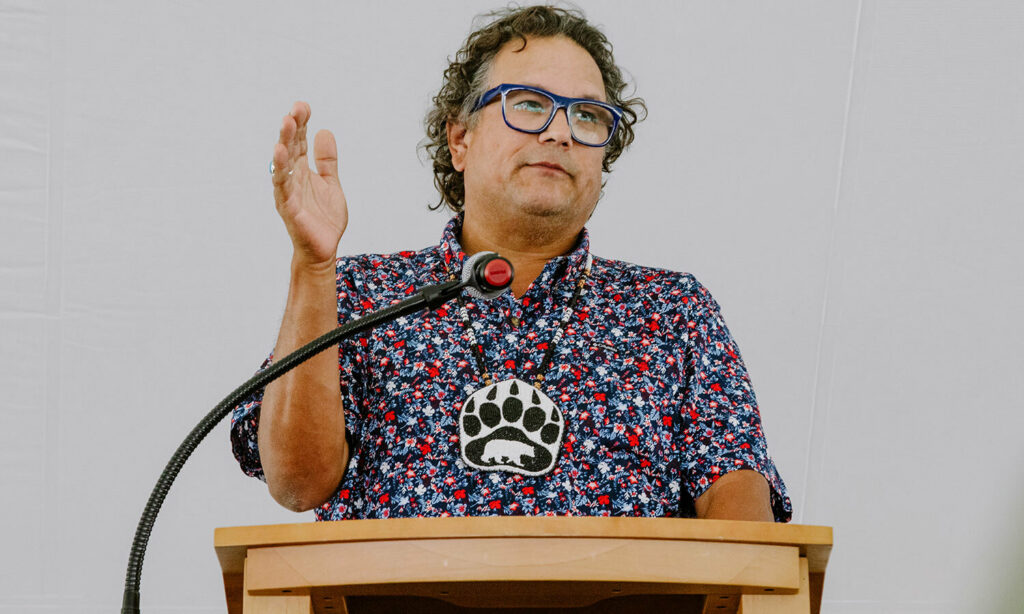Transcript: Author Jesse Wente introduces filmmaker Alanis Obomsawin, the 63rd Edward MacDowell Medalist, on July 23, 2023.
Amis, Bonjour!
[Introduces himself in Anishinaabe]
I just introduced myself. My name is Jesse Wente as you heard. I’m Anishinaabek, from Genaabaajing, on the north shore of Lake Huron. My clan is bear clan, as you might be able to tell. [gesturing to his clan necklace]
It is my great honour and privilege to be here to present this award to Alanis Obomsawin. I can think of no one more deserving than Alanis.
I first met Alanis 30 years ago, at a screening of her landmark documentary Kanehsatake: 270 Years of Resistance. But like many, I first encountered her nearly a decade before. It was when I was just about ten years old that I saw my first Alanis Obomsawin film, Incident at Restigouche, which was broadcast on TV in Canada. Never before had I seen an Indigenous woman – who looked a lot like my Mom – on TV, let alone challenging a government official over First Nations rights. That moment changed my perception of cinema – its potential, and my potential place within it.
Alanis has inspired countless people in the exact same way. Hers was a voice, a face, that was often singular in the media in Canada, and for so many of us, she was a beacon of what could be done. That there is so much more Indigenous media today – all around the world – that we now have organizations and institutions to support our filmmaking and storytelling – so much of that is because of Alanis and the inspiration she provides.
Her work is no less impactful. Across more than 50 years and 56 films, Alanis has held a mirror up to Canada and colonialism. She has provided the microphone for many to use their voices to speak truth to power. Her cinema is the cinema of listening and giving voice. It’s a decolonial approach that existed before such notions were the topic of dissertations, university courses or training seminars. I don’t even think anyone knew what the word “decolonization” was when Alanis started her work. Her cinema is of the people in a way that most documentaries never even attempt to be. That too has provided a path for an Indigenous cinema ethic that persists. One that resists extractionist methodologies and centres the subject at all times. It is community-based filmmaking ethic embodied by one individual and her work.
And just to give you the briefest Indigenous cinema history lesson, Indigenous cinema, unlike every other national cinema, was founded by women.
[applause]
Two women to be precise, from Aotearoa, Merata Mita, who a few years ago joined her ancestors, and Alanis, who joins us here today.
[applause]
It’s a career and impact that would likely not exist without publicly funded arts like we have in Canada with the National Film Board. And I say this because I am chair of the single largest arts funding body in Canada, but I also say this because I know this is not a privilege found often enough here, below the medicine line, and also because the value of public arts is so often questioned, and I believe Alanis and her work provides as compelling reasoning as one could ever need.
Thirty years after first meeting her, I stand here privileged to call Alanis my colleague, my mentor, my fellow warrior, and most of all, my friend. I hope she knows that the work that I have done was all inspired by her, and that her presence will resonate beyond seven generations.
My people, we believe that you exist on this world to do deeds that will live seven generations into the future and that we are here as a result of choices made seven generations in the past. That is the purpose of life, to honor the people we will never meet. And Alanis has done this so well.
So congratulations Alanis on this wonderful honour, and as always chi miigwetch, chi miigwetch, chi miigwetch, chi miigwetch, for all that you are. And congratulations!
[applause]
Read author and Fellow Nell Painter's welcome to visitors under the Medal Day tent
Read Board President Christine Fisher's words to the gathered arts lovers on Medal Day
Read new Executive Director Chiwoniso Kaitano's first address to the 2023 Medal Day crowd
Read Resident Director David Macy's tribute to Michael Chabon and Ayelet Waldman
Read Alanis Obomsawin's heartfelt acceptance of the Edward MacDowell Medal

